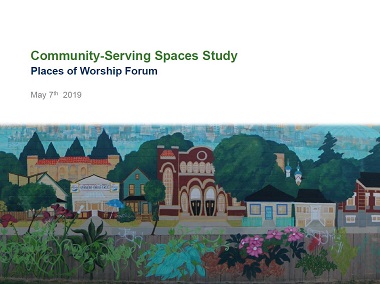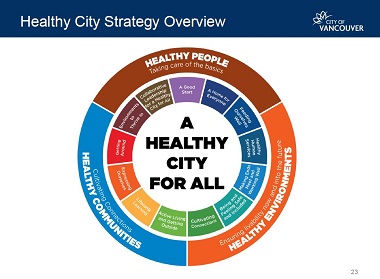
The Community-Serving Spaces Study was carried out for the City of Vancouver.
Generations ago some wag coined the local aphorism, “Vancouver’s favourite bloodsport is real estate investment.” I first heard it when I arrived in the city 22 years ago during a period of rapid rise in home prices, one that now looks tame compared to what we’ve experienced over the past decade. It’s impossible to ignore the mounting casualties.
Vancouver’s congregations are among them. During the Vancouver Consultation that Flyn Ritchie and I conducted over the course of 2016, and in many conversations since then, pastors in every neighbourhood have described how the affordability crisis is undermining the viability of their congregations.
On the one hand, they’re losing young adults and families to the outer suburbs. With these goes the future leadership of their church, not to mention tithes. On the other hand, those who remain have much smaller margins of energy and time for discipleship or volunteering than prior generations. Those who move but make the long commute on Sundays have less margin still.
Meanwhile, their church buildings desperately need major repair, if they’re worth keeping at all, given costs, size or architectural features better suited to 19th century modes of being church.
No surprise, then, that real estate developers are circling church properties like birds of prey.
But it’s not just pastors and denominational executives who are alarmed. City hall is too, albeit for different reasons.
 In the secular terms of municipal zoning and planning, “places of worship” are extremely valuable – well nigh irreplaceable – insofar as they function as “community-serving spaces” for a wide gamut of uses that make for a more resilient, neighbourly, equitable and creatively expressive city.
In the secular terms of municipal zoning and planning, “places of worship” are extremely valuable – well nigh irreplaceable – insofar as they function as “community-serving spaces” for a wide gamut of uses that make for a more resilient, neighbourly, equitable and creatively expressive city.
Of the 311 community-serving sites in Vancouver not owned by the City, 264 are places of worship, and (by my count) some 215 of these are Christian churches.
Municipal politicians and staff are aware that upwards of 9,000 congregations across Canada are projected to shut down in the next 10 years. They’re determined to do all they can to minimize the loss of church properties, and thus their uses for the common good, to market housing developers.
City of Vancouver staff from five departments are engaged in two major projects to draft policy changes they hope will preserve, enhance and expand community-serving spaces in Vancouver for generations to come.
One is the Affordable Housing and Community Spaces Incentive Program (AHCSIP), which is focused on helping places of worship as well as non-profit housing operators and societies.
The second is the Community-Serving Spaces Policy, which is focused on places of worship, Legion Halls, ethnic culture centres, neighbourhood houses, etc.
I’m delighted to be involved in this process as I was contracted by the City to facilitate two focus groups earlier this year as well as a larger forum May 7, for places of worship that have attempted or are seriously considering to redevelop their property to include affordable housing and/or enhanced community-serving spaces.
The summary report from the forum will be completed soon and circulated to the 41 church leaders who participated in the forum. When that happens, I will share here the key takeaways from it as well as my own hopes for how it may be opening a door for the first time for truly substantive and ongoing dialogue between the city and communities of faith.
Meanwhile, I encourage you to become familiar with the city’s plan to synergize its numerous aspirational strategies under the impressively holistic Healthy City Strategy. You can download a copy of the Strategy here, explore its background and 13 goals here, and watch a short video introducing it here.
A central feature of the forum was an exercise to overlay what is happening in church facilities onto the Strategy’s diagram of urban flourishing. Does your church have a vision for mission as encompassing as this diagram? What would you add to the diagram? Why? What would it take to make adjustments in your church or in the civic processes that devised the Strategy and are now implementing it?
Jonathan Bird is church relations specialist with Union Gospel Mission and executive director of CityGate Leadership Forum.

Thanks Flyn for sharing this good news. I am excited to know you’ll be an active part of that initiative! True worship and places of worship are indeed at the heart of health: physical, mental and in society.
Thanks Claudia. Well, I’ll be keeping a close eye on Jonathan’s involvement anyway, and hope to keep us up to date on whatever results from these meetings.